Ken Levine interview
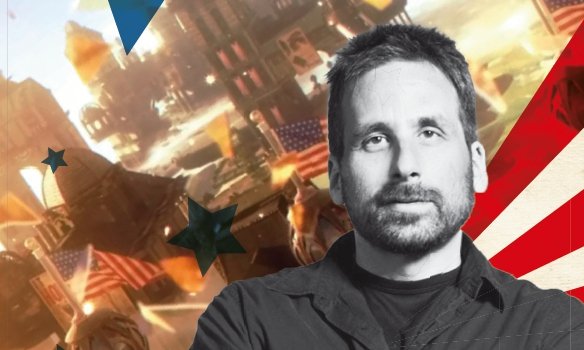
This interview first appeared in PC Gamer UK issue 233.
BioShock Infinite is a first-person shooter like its predecessors, but a less lonely one. You play Booker DeWitt, who is trying to escape the flying city of Columbia with a girl named Elizabeth before a terrifying steampunk robot called Songbird catches her. The city is a spectacular airborne flotilla of districts suspended by vast balloons – a testament to America's cultural might, and its fondness for things that are big but not terribly useful. Our last good look at the game was a spectacular 15-minute demonstration at E3 .
I spoke to creative director Ken Levine about why Elizabeth is the centrepiece not just of the story, but of the technology that drives it.
PC Gamer: Your personal story seems to be about rescuing Elizabeth from Songbird. How does that tie in to the revolution that's going on in the world around you?
Ken Levine: Elizabeth is the catalyst for what sets this revolution that's going in slow motion into one that's going at hyperspeed. The fact that you bust her out of this tower where you find her at the beginning of the game... the Queen comes into play on the board.
And each side – the Founders on one side, and the Vox Populi on the other side – feels that Elizabeth is essential to them accomplishing their goals. The Founders want to keep her locked up in the tower, and the Vox Populi want to destroy her. This is because she is part of a prophecy: it is believed that if Elizabeth dies, the city falls with her.
That's all the Vox Populi want, to take the symbol of their oppressor and make it tumble from the heavens.
Keep up to date with the most important stories and the best deals, as picked by the PC Gamer team.
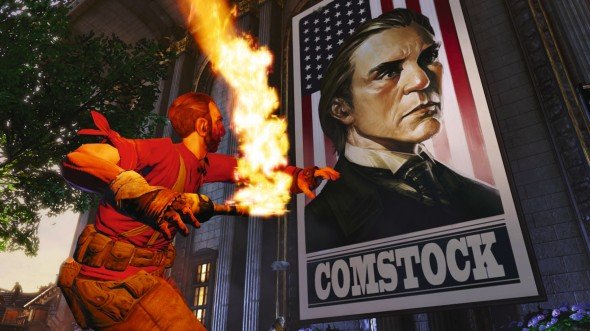
PC Gamer: Aren't they also on the city, though?
Ken Levine: Yeah, they are, but you know what? They don't care.
PC Gamer: So it's like suicide bombing on a massive scale?
Ken Levine: Yeah. Well, if you go back to the Anarchist movements of that period, their symbol was a bomb. They have to tear down the system to rebuild it.
PC Gamer: How do you go about making the player care about a companion character like Elizabeth?
Ken Levine: In terms of emotional connection, I thought about this for a long time. Because you only know this character for a period of hours, and you have to make a connection with her. And in real life that just doesn't happen – relationships take a long time to form.
So I spent a lot of time thinking about that: “How can you make a relationship form quickly? How do you cement a relationship fast?”
And one of the things that we kept coming back to was soldiers – the kinds of bonds that soldiers form, when their lives are in danger and they make these incredible sacrifices for each other. And I think that it is sacrifice that makes people form relationships very, very quickly, with people that you don't really know very well.
And so I just started thinking about how we can make Elizabeth and Booker perform sacrifices for each other, and how that would draw them together. And that's what we did with the narrative of the demo we showed at E3: a little microcosm of that.
It's basically a story of sacrifice, and she sets up her own stakes: this is the thing she wants out of life, and this is what she wants least out of life – to go back with this... thing, Songbird.
And what does she do at the end of the demo? She goes back. And then that puts Booker in a situation where the onus is on him. She made the sacrifice for him, what does he have to do for her?
It's one thing to say that the princess is in another castle, it's another thing to say that she's there because of you . And not you as in the backstory, but you as in what happened in the game.
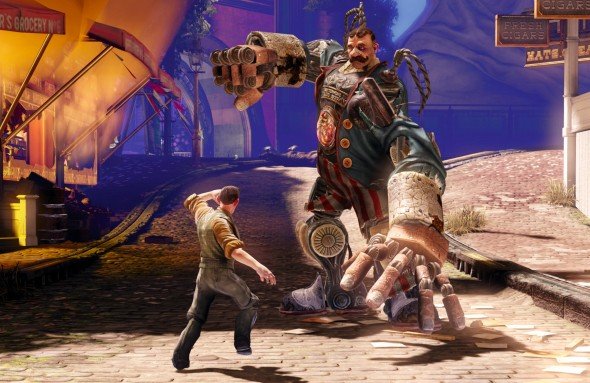
PC Gamer: How much work does it take to produce a demo like the E3 one?
Ken Levine: For us it's a lot of work, and the reason it's challenging is that obviously you're bringing things to a level of polish ahead of the rest of the game. But the thing for us that's useful, that actually saves us time, is that it forces us to get real, you know? We can't say, “Oh, that'll be fine once that part's in,” or “Yeah, don't worry about that.”
It sort of forces us to bring it to a point where it actually has to stand up for itself. These Skylines, it's not, “They'll look good,” or “They're going to feel fine.” It's, “Do they look okay? Do they feel okay? Do they seem interesting? Do they seem fun?” We have to make those determinations.
Like interacting with Elizabeth: “Well, yeah it'll be great! Trust me!” We actually have to bring it to a point where we start to get a sense of that, internally on the team, and I think that's very valuable for us.
PC Gamer: So it's almost like a preview for you – you're finding out what your game's going to be like and how it works.
Ken Levine: Absolutely. So quite often you'll encounter things that you realise are not going to work, and you have to either figure out how to make them work, or say they're not going to be part of the game. And that happens a lot during our demos.
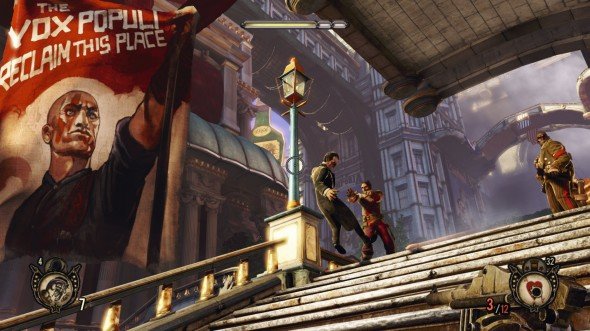
PC Gamer:There are moments in the demo that seem scripted, and others where it seems like you could go anywhere. Can you?
Ken Levine: Well, I'd say it's much like BioShock. It's just that the levels are geometrically larger, and they seem more vertical. But I don't want to give an impression that this is a Grand Theft Auto or a Red Dead game.
I think the big thing that is interesting for us in this is that... we controlled that demo, but if we want Elizabeth to do a bit of business – like the part where she picks up the Abraham Lincoln head – what if the player doesn't go there? What if the player's busy? What if they're in combat at the time?
And so we have this system where we build these bits of business like the Lincoln head, and Elizabeth says to the game: “Hey, I'd like to pick up the Lincoln head now and show it to the player, can I do that?” And the game either says, “Yes, this is a good time,” or, “No.” And if the game says no, we'll place the other opportunity somewhere else in the level for her to do that bit of business and again, it'll check: “Hey, is this a good time?”
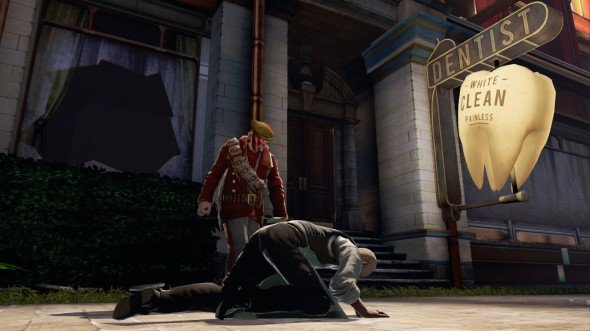
PC Gamer: Does that mean she'll carry the Lincoln head through the whole level, waiting for you to turn around?
Ken Levine: No, it means that we would place the Lincoln head in the level, but say she picks up the Lincoln Head and all of a sudden the player gets attacked, she has to get rid of it. So we need to account for that, or she's carrying this stupid Lincoln head throughout the level.
But we also have another system on top of that which is saying, “We don't want all these bits of business to either happen at the very beginning or the very end of the level, as if the player is sort of rushing them to the end.” [It] works like content distribution, saying, “Has Elizabeth just done something recently, or has she not done something for a while? We should try to make her do something now.”
So, those bits – you could say that they're scripted in a sense, but they could happen at numerous places throughout the level, because we don't know what the player's going to do. So we have to account for it, and Elizabeth has to seem both fluid and consistent.
That is probably the most complicated thing – in fact, I wouldn't say probably, I'd say it is the most complicated thing in the game, because she's so content-heavy.
She has her roots in the Big Daddy and Little Sister characters in some ways. And I say that in terms of how we had to think about it, because Big Daddy was trying to go through all these little bits of business as well: Little Sister would get tired, and Big Daddy would control the speed he was moving at. And we had to do that in places where we didn't know what players were going to be doing. Their paths weren't entirely predetermined, nor were their actions on that path entirely predetermined. So she's just like an incredibly, incredibly complicated version of that.
I don't think anybody's done anything exactly quite like this, because she's performing these continually scripted things in areas where we can't control the action.
PC Gamer: Were you tempted to put that in a restrictive context, where the player loses control of his view and has to see Elizabeth do this cool thing?
Ken Levine: We have this theory – and I can't say whether it makes sense, but... the less we take control away from the player, the better. That's always been our structure in terms of storytelling, it's always been our approach back from System Shock 2 to BioShock. We try to tell a story that is deep in narrative, but without asking the player to be restricted for it – and that's very tough to do. But we think it's worth it
BioShock Infinite is out in 2012.

